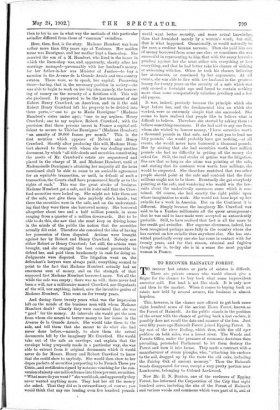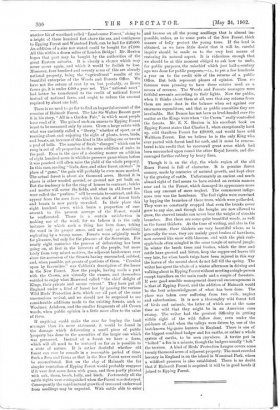TO RECOVER HAINAIJLT FOREST.
TO recover lost estates or parts of estates is difficult. There are private owners who would almost give a finger for the chance to buy back what some improvident ancestor sold. But land is not like stock. It is only now and then in the market. When it comes to buying back an estate now held by several owners, the business is almost hopeless.
This, however, is the chance now offered to get back some eight hundred acres of the ancient Essex Forest, known as the Forest of Hainault. As the public stands in the position of the owner with the chance of getting back a lost enclave, it possibly does not recall the date and manner of the loss. Just over fifty years ago Hainault Forest joined Epping Forest. It lay east of the river Reding, which thus, with the old ager publicus on both sides, was a forest river. The Woods and Forests Office, under the pressure of economic doctrines then prevailing, persuaded Parliament to let them destroy the Forest and turn it into farms. They made a contract with a manufacturer of steam ploughs, who, "attaching his anchors to the soil, dragged up by the roots the old oaks, including the Fairlop Oak of ancient memory." Thus the Hainault woods disappeared for ever, except a very pretty portion near Lambourne, belonging to Colonel Lockwood.
Now Mr. E. N. Buxton, one of the verderers of Epping Forest, has informed the Corporation of the City that eight hundred acres, including the site of the Forest of Hainault and various woods and commons which were part of it, and of another bit of woodland called "Lambourne Forest," rising to a height of three hundred feet above the sea, and contiguous to Epping Forest and Wanstead Park, can be had for 220,000. An addition of a size not stated could be bought for £7,000. All this within a dozen miles of London Bridge! Mr. Buxtan hopes that part may be bought by the authorities of the great Eastern suburbs. It is clearly a chance which may never occur again, and which it would be foolish to lose. Moreover, four hundred and seventy acres of this are already national property, being the "agricultural ". results of the beautiful enterprise of the Woods and Forests Office. We have not the return of rent by us, but probably, as Essex farms go, it is under £400 a year net. This "national asset" had better be transferred to the credit of national forest instead of national farm, and ought to reduce the amount required by about one half.
There is no need to go far to find an impartial account of the remains of Hainault Forest. The late Sir Walter Besant gave it in his story, "All in a Garden Fair," in which most people have read of it. The gain of such an annexe to Epping Forest is not to be measured only by acres. Given a large estate with what was anciently called a "liberty," whether of sport, or of roaming about and enjoying the sight of plants, trees, birds, and beasts, an increase of this kind is like adding one or two to a peal of bells. The number of fresh "changes" which can be rung is out of all proportion to the mere addition of units to the peal. Even in the case of a shooting manor an addition
of eight hundred acres in which to preserve game where before it was poached will often raise the yield of the whole property. In this case, reading "birds, deer, and other forest animals" in place of "game," the gain will probably be even more marked. The actual forest is about six thousand acres. Round it in places is other wooded ground, or ground not yet built on. But the tendency is for the ring of houses to contract ; bricks and mortar will cover the fields, and what in old forest law were called the " purlieus " will be certain to contract, and dis- appear from the area from which the stock of forest birds and beasts is now partly recruited. In their place this eight hundred acres, which bears a proportion of one- seventh to the present acreage of the • Forest, would be reafforested. There is a certain satisfaction in making use of the word, for we believe it is the only instance in which such a thing has been done, taking the word in its proper sense, and not only as describing replanting by a wrong name. Forests were originally made for pleasure, but only for the pleasure of the Sovereign. For nearly eight centuries the process of deforesting has been going on, at first in the interests of the people, but more lately from very mixed motives, the adjacent landowners ever since the accession of the Stuarts having encroached, cribbed, and, when possible, got grants of portions of them. "Crawled upon by favourites" was Cobbetes description of the losses in the New Forest. Now the people, having made a pact with the Crown, are virtually the owners, and themselves • entitled to enjoy what Manwood called "the chief delight of Kings, their private and secure retreat." They have put all England under a kind of forest law by passing the various Wild Birds' Protection Acts, which are all part of the same unconscious revival, and we should not be surprised to see considerable additions made to the existing forests, such as Woolmer, Ashdown, and the smaller fragments of old Crown woods, when public opinion is a little more alive to the value of them.
If anything could make the case for buying the land stranger than its mere statement, it would be found in the damage which deforesting a small piece of public [property has done to the amenities of the larger one which was preserved. Instead of a forest we have a farm, which will all need to be restored so far as is possible to a state of nature. It is rather doubtful whether old forest can ever be remade in a reasonable period of time. Such a flora and fauna as that in the New Forest never could le reconstituted. But on the clay of Hainault the far simpler vegetation of Epping Forest would probably reappear if it were first sown down with grass, and then partly planted with -oak, thorn, beech, holly, and birch. Fortunately all the cattle rights were extinguished when the Forest was destroyed.
• Consequently the rapid natural growth of trees and underwood ' from seedlings may be expected. With cattle able to enter and browse on all the young seedlings that is almost im- possible, unless, as in some parts of the New Forest, thick masses of holly protect the young trees. If the land is obtained, as we have little doubt that it will be, careful inquiry should be made as to the very best means of restoring its natural aspect. It is ridiculous enough that we should be at this moment obliged to ask how to undo, for public purposes, the mischief which just half-a-century ago was done for public purposes,—i.e., to put a few hundreds a year on to the credit side of the returns of a public Office. But both represent phases of opinion. Then re- formers were pressing to have these estates used as a means of revenue. The Woods and Forests managers were faithful servants according to their lights. Now the public, when it thinks about them at all, sees that any returns from them are mere dust in the balance when set against our enormous expenditure, and that as public amenities they are invaluable. But Demos has not been as level-headed over the matter as the Kings were when "the Crown" really controlled the forests. Mr. E. N. Buxton in his excellent book on Epping Forest states that Charles I., when exceptionally hard up, sold Gaultres Forest for £20,000, and would have sold Waltham Forest. But we believe he is the only King who ever parted with forest land for cash, and it must be remem- bered to his credit that he recovered great areas which had been encroached upon round the other Royal forests, and dis- couraged further robbery by heavy fines.
Though it is on the clay, the whole region of the old Essex Forest is full of character. It is genuine forest scenery, made by centuries of natural growth, and kept clear by the grazing of cattle. Unfortunately an ancient and much abused right of fuel seems to have existed on certain manors near and in the Forest, which damaged its appearance more than any amount of mere neglect. The commonest indige- nous tree was the hornbeam. The fuel rights were exercised by lopping the branches of these trees, which were pollarded. They were so constantly cropped that even the trunks never grew to any size, and though the boughs are now allowed to grow, the starved trunks can never bear the weight of sizeable branches. But there are some quite beautiful woods, as well as the forest thickets. At the time of writing, and also in the late autumn, these thickets are very beautiful where, as is generally the case, they are mainly great bushes of hawthorn, now covered like snow with blossom, and with the pink crab- apple buds often mingled in the same tangle of natural jungle. In winter the beech trees and bushes, which the deer and cattle have gnawed and bitten, keep the copper-red leaves till very late, for when beech twigs have been injured in this way the leaves of the second shoot do not fall till the spring. The writer has spent the whole of a winter afternoon in driving and walking about in Epping Forest without meeting a single person except travellers on the main roads and a couple of foresters. If ever good sensible management deserved encouragement it is that of Epping Forest, and the addition of Hainault would be the best acknowledgment of what has been done. The place was taken over suffering from two evils, neglect and suburbanism. It is now a thoroughly wild forest full of birds and animals, the latter of which are at the same time so wild that they might be in an American cane swamp. The writer had the greatest difficulty in getting within sight of the wild fallow deer, even under the guidance of, and when the valleys were driven by, one of the best-known big-game hunters in England. There is one of the biggest combined badger and fox earths, or rather a whole system of earths, to be seen anywhere. A terrier put in "bolted" a fox in a minute, though the badgers usually "bolt" the terriers. A kind of Birds' Protection League covers some twenty thousand acres of adjacent property. The most crowded heronry in England is on the island in Wanstead Park, where a wildfowl preserve is also established. There is no doubt that if Hainault Forest is acquired it will be in good hands if joined to Epping Forest.







































 Previous page
Previous page